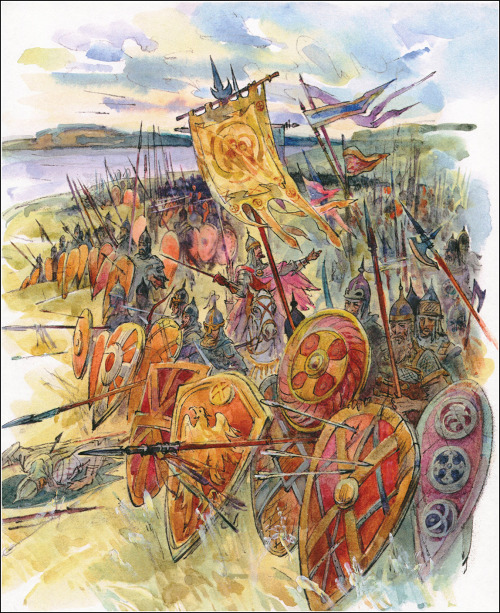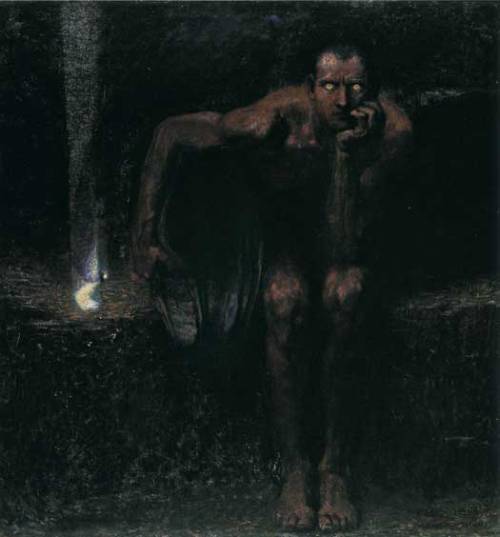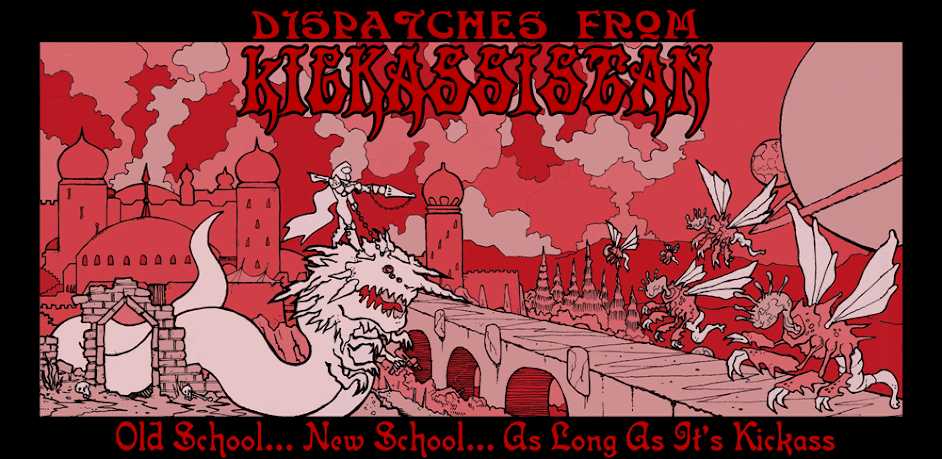My previous post on Hulasz-Arat was meant to give the players in my Tuesday night DCC game a general sense of what I was envisioning for the backdrop of the world. Before we got to the point where folks were making traditional medieval assumptions about how the world worked, I thought I'd nip any of that boring stuff in the bud. Leave your tree-huggin', elf-clogged prancetasy at home, friends, it's time to journey into the Cradle of Sin.
So the mini-setting has a name: The Cradle of Sin. I wanted something that got close to "Cradle of Civilization," didn't get too close to "Cradle of Filth" and still got across the concept that the area is an old one for the human species, rife with corruption and vice. After lots of attempts at plays on words that tried to sound like "Cradle of Civilzation," I decided to stick to what my gut told me and call it the Cradle of Sin.
As the party draws close to first level (some have hit it already), I thought I'd talk a little bit about how each class fits into Hulaszi society.
 As each year of the Hazzakhi occupation of Hulasz-Arat continues, fewer and fewer youths practice the martial arts traditional to the Hulaszi people, favoring instead the fast mounted tactics of the conquering horsemen. Traditional Hulaszi warriors, called tserstezi, are masters of the bronze spear and khopesh, each weapon having specific symbolism: the bronze spear signifies a willingness to fight for the city-state, whereas the khopesh, a close-quarters weapon, signifies a devotion strong enough to die for it. Recently, a band of such tsersezi have made the wine hall known as the Brazen Saint their de facto headquarters, and though they have yet to take any action against the Hazzakhi establishment, the warriors -- who have come to be called "the Brazen Saints" themselves -- have taken it upon themselves to support their kinsmen and defend them from real or imagined oppression and slights from the Hazzakhi. So far, any outbreaks of actual violence haven't strayed beyond fisticuffs and property damage, but these proud sons and daughters of Hulasz-Arat enjoy a waxing popularity that has Sheikh Vassad and his advisors paying close attention.
As each year of the Hazzakhi occupation of Hulasz-Arat continues, fewer and fewer youths practice the martial arts traditional to the Hulaszi people, favoring instead the fast mounted tactics of the conquering horsemen. Traditional Hulaszi warriors, called tserstezi, are masters of the bronze spear and khopesh, each weapon having specific symbolism: the bronze spear signifies a willingness to fight for the city-state, whereas the khopesh, a close-quarters weapon, signifies a devotion strong enough to die for it. Recently, a band of such tsersezi have made the wine hall known as the Brazen Saint their de facto headquarters, and though they have yet to take any action against the Hazzakhi establishment, the warriors -- who have come to be called "the Brazen Saints" themselves -- have taken it upon themselves to support their kinsmen and defend them from real or imagined oppression and slights from the Hazzakhi. So far, any outbreaks of actual violence haven't strayed beyond fisticuffs and property damage, but these proud sons and daughters of Hulasz-Arat enjoy a waxing popularity that has Sheikh Vassad and his advisors paying close attention.
 Thieves are commonly found at the interstices between classes within a society and where that society meets up with others. In Hulasz-Arat, this interstice can be found squarely within the domain of ostlers, animal handlers, drovers, breeders, stable hands, shepherds and other keepers of animals, particularly horses and camels. Horses are especially prized by the Hazzakhi conquerors, and while they offer great prestige to the mightiest of their cavalrymen, they spare little contempt for those who keep their animals, saving the ignominy of this nearly "untouchable" class for conquered peoples and slaves. In Hulasz-Arat, this status, along with the corresponding middle-class status for the same tasks amongst the Hulaszi, means that the ranks of animal handlers has swelled with thieves, smugglers, fences, forgers and other ne'erdowells, most of whom offer at least lip service and some small amount of their income to the Drovers' Filial Society. The Drovers' is ostensibly an occupational guild, but its network of corruption, vice and graft masquerading as essential services makes it easily the largest organized criminal endeavor to be found in Hulasz-Arat.
Thieves are commonly found at the interstices between classes within a society and where that society meets up with others. In Hulasz-Arat, this interstice can be found squarely within the domain of ostlers, animal handlers, drovers, breeders, stable hands, shepherds and other keepers of animals, particularly horses and camels. Horses are especially prized by the Hazzakhi conquerors, and while they offer great prestige to the mightiest of their cavalrymen, they spare little contempt for those who keep their animals, saving the ignominy of this nearly "untouchable" class for conquered peoples and slaves. In Hulasz-Arat, this status, along with the corresponding middle-class status for the same tasks amongst the Hulaszi, means that the ranks of animal handlers has swelled with thieves, smugglers, fences, forgers and other ne'erdowells, most of whom offer at least lip service and some small amount of their income to the Drovers' Filial Society. The Drovers' is ostensibly an occupational guild, but its network of corruption, vice and graft masquerading as essential services makes it easily the largest organized criminal endeavor to be found in Hulasz-Arat.
 The Hulaszi still follow the old ways, worship the gods who came before the Hazzakhi. Though there are shrines to any number of gods throughout the streets of Hulasz-Arat and would-be prophets harrangue marketgoers with freshly-imagined dooms and terrors of the afterlife, one institution remains at the heart of Hulaszi spiritual life: the Temple of Owls. In ages past, the ancestors of today's Hulaszi sought the wisdom of the Greatfather of Owls, a primordial spirit that was ancient when the serpent men built their first temples to science and sorcery. The Greatfather asks for few favors nor does he assure the health of crops or other mundane affairs. In exchange for routine sacrifices of livestock and devotional verses (he seems to cherish poetry, particularly clever rhymes or philosophical subject matter), the Greatfather of Owl provides his priests and supplicants with visions, snippets of prophecy and surprisingly specific scraps of knowledge at remarkably opportune times.
The Hulaszi still follow the old ways, worship the gods who came before the Hazzakhi. Though there are shrines to any number of gods throughout the streets of Hulasz-Arat and would-be prophets harrangue marketgoers with freshly-imagined dooms and terrors of the afterlife, one institution remains at the heart of Hulaszi spiritual life: the Temple of Owls. In ages past, the ancestors of today's Hulaszi sought the wisdom of the Greatfather of Owls, a primordial spirit that was ancient when the serpent men built their first temples to science and sorcery. The Greatfather asks for few favors nor does he assure the health of crops or other mundane affairs. In exchange for routine sacrifices of livestock and devotional verses (he seems to cherish poetry, particularly clever rhymes or philosophical subject matter), the Greatfather of Owl provides his priests and supplicants with visions, snippets of prophecy and surprisingly specific scraps of knowledge at remarkably opportune times.
[Clerics who venerate the Greatfather of Owls may choose to forego one 1st-level known spell and receive Second sight instead.]
So the mini-setting has a name: The Cradle of Sin. I wanted something that got close to "Cradle of Civilization," didn't get too close to "Cradle of Filth" and still got across the concept that the area is an old one for the human species, rife with corruption and vice. After lots of attempts at plays on words that tried to sound like "Cradle of Civilzation," I decided to stick to what my gut told me and call it the Cradle of Sin.
As the party draws close to first level (some have hit it already), I thought I'd talk a little bit about how each class fits into Hulaszi society.
Warriors
 As each year of the Hazzakhi occupation of Hulasz-Arat continues, fewer and fewer youths practice the martial arts traditional to the Hulaszi people, favoring instead the fast mounted tactics of the conquering horsemen. Traditional Hulaszi warriors, called tserstezi, are masters of the bronze spear and khopesh, each weapon having specific symbolism: the bronze spear signifies a willingness to fight for the city-state, whereas the khopesh, a close-quarters weapon, signifies a devotion strong enough to die for it. Recently, a band of such tsersezi have made the wine hall known as the Brazen Saint their de facto headquarters, and though they have yet to take any action against the Hazzakhi establishment, the warriors -- who have come to be called "the Brazen Saints" themselves -- have taken it upon themselves to support their kinsmen and defend them from real or imagined oppression and slights from the Hazzakhi. So far, any outbreaks of actual violence haven't strayed beyond fisticuffs and property damage, but these proud sons and daughters of Hulasz-Arat enjoy a waxing popularity that has Sheikh Vassad and his advisors paying close attention.
As each year of the Hazzakhi occupation of Hulasz-Arat continues, fewer and fewer youths practice the martial arts traditional to the Hulaszi people, favoring instead the fast mounted tactics of the conquering horsemen. Traditional Hulaszi warriors, called tserstezi, are masters of the bronze spear and khopesh, each weapon having specific symbolism: the bronze spear signifies a willingness to fight for the city-state, whereas the khopesh, a close-quarters weapon, signifies a devotion strong enough to die for it. Recently, a band of such tsersezi have made the wine hall known as the Brazen Saint their de facto headquarters, and though they have yet to take any action against the Hazzakhi establishment, the warriors -- who have come to be called "the Brazen Saints" themselves -- have taken it upon themselves to support their kinsmen and defend them from real or imagined oppression and slights from the Hazzakhi. So far, any outbreaks of actual violence haven't strayed beyond fisticuffs and property damage, but these proud sons and daughters of Hulasz-Arat enjoy a waxing popularity that has Sheikh Vassad and his advisors paying close attention.Thieves
 Thieves are commonly found at the interstices between classes within a society and where that society meets up with others. In Hulasz-Arat, this interstice can be found squarely within the domain of ostlers, animal handlers, drovers, breeders, stable hands, shepherds and other keepers of animals, particularly horses and camels. Horses are especially prized by the Hazzakhi conquerors, and while they offer great prestige to the mightiest of their cavalrymen, they spare little contempt for those who keep their animals, saving the ignominy of this nearly "untouchable" class for conquered peoples and slaves. In Hulasz-Arat, this status, along with the corresponding middle-class status for the same tasks amongst the Hulaszi, means that the ranks of animal handlers has swelled with thieves, smugglers, fences, forgers and other ne'erdowells, most of whom offer at least lip service and some small amount of their income to the Drovers' Filial Society. The Drovers' is ostensibly an occupational guild, but its network of corruption, vice and graft masquerading as essential services makes it easily the largest organized criminal endeavor to be found in Hulasz-Arat.
Thieves are commonly found at the interstices between classes within a society and where that society meets up with others. In Hulasz-Arat, this interstice can be found squarely within the domain of ostlers, animal handlers, drovers, breeders, stable hands, shepherds and other keepers of animals, particularly horses and camels. Horses are especially prized by the Hazzakhi conquerors, and while they offer great prestige to the mightiest of their cavalrymen, they spare little contempt for those who keep their animals, saving the ignominy of this nearly "untouchable" class for conquered peoples and slaves. In Hulasz-Arat, this status, along with the corresponding middle-class status for the same tasks amongst the Hulaszi, means that the ranks of animal handlers has swelled with thieves, smugglers, fences, forgers and other ne'erdowells, most of whom offer at least lip service and some small amount of their income to the Drovers' Filial Society. The Drovers' is ostensibly an occupational guild, but its network of corruption, vice and graft masquerading as essential services makes it easily the largest organized criminal endeavor to be found in Hulasz-Arat.Clerics
 The Hulaszi still follow the old ways, worship the gods who came before the Hazzakhi. Though there are shrines to any number of gods throughout the streets of Hulasz-Arat and would-be prophets harrangue marketgoers with freshly-imagined dooms and terrors of the afterlife, one institution remains at the heart of Hulaszi spiritual life: the Temple of Owls. In ages past, the ancestors of today's Hulaszi sought the wisdom of the Greatfather of Owls, a primordial spirit that was ancient when the serpent men built their first temples to science and sorcery. The Greatfather asks for few favors nor does he assure the health of crops or other mundane affairs. In exchange for routine sacrifices of livestock and devotional verses (he seems to cherish poetry, particularly clever rhymes or philosophical subject matter), the Greatfather of Owl provides his priests and supplicants with visions, snippets of prophecy and surprisingly specific scraps of knowledge at remarkably opportune times.
The Hulaszi still follow the old ways, worship the gods who came before the Hazzakhi. Though there are shrines to any number of gods throughout the streets of Hulasz-Arat and would-be prophets harrangue marketgoers with freshly-imagined dooms and terrors of the afterlife, one institution remains at the heart of Hulaszi spiritual life: the Temple of Owls. In ages past, the ancestors of today's Hulaszi sought the wisdom of the Greatfather of Owls, a primordial spirit that was ancient when the serpent men built their first temples to science and sorcery. The Greatfather asks for few favors nor does he assure the health of crops or other mundane affairs. In exchange for routine sacrifices of livestock and devotional verses (he seems to cherish poetry, particularly clever rhymes or philosophical subject matter), the Greatfather of Owl provides his priests and supplicants with visions, snippets of prophecy and surprisingly specific scraps of knowledge at remarkably opportune times.[Clerics who venerate the Greatfather of Owls may choose to forego one 1st-level known spell and receive Second sight instead.]


Comments
Post a Comment